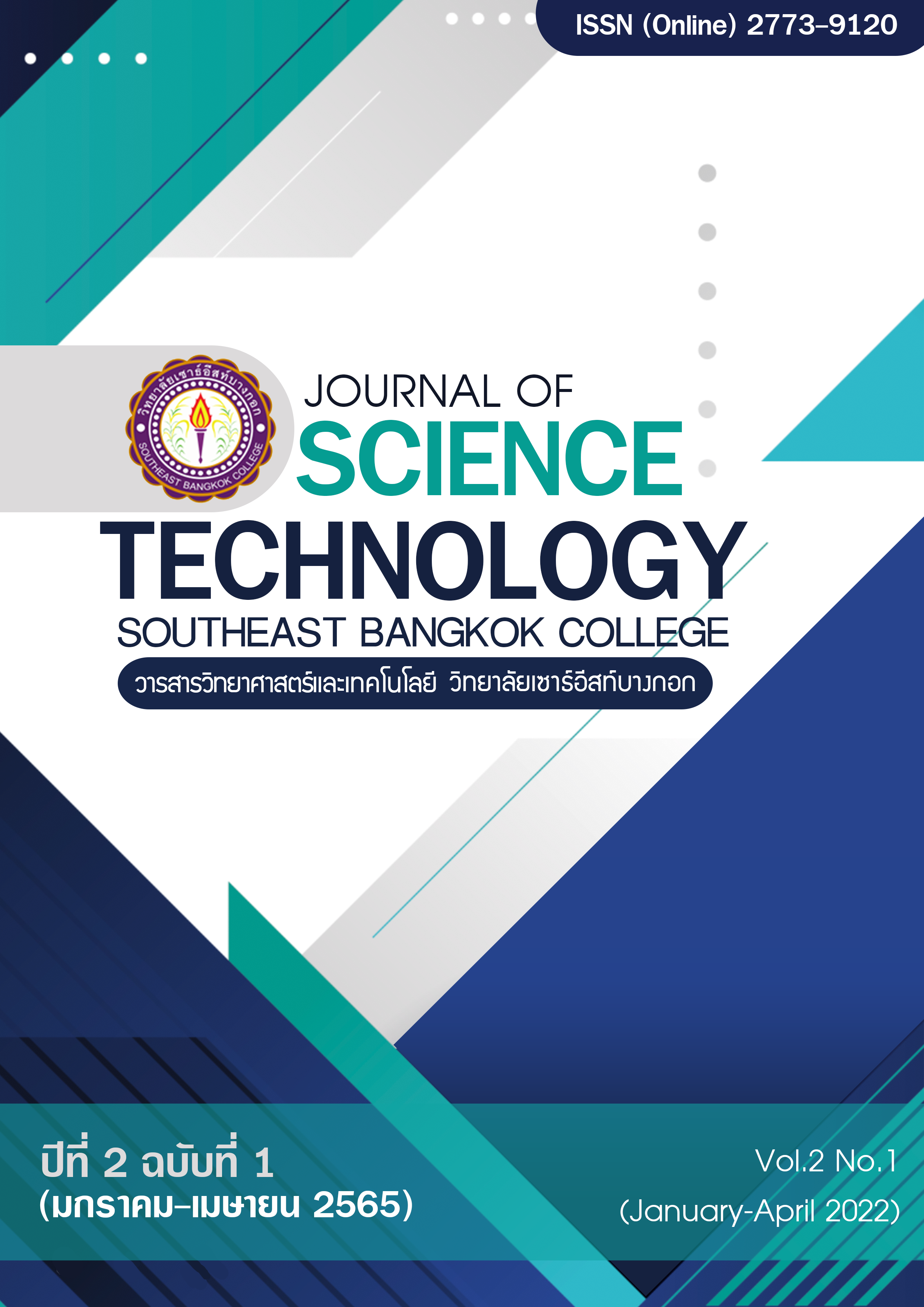ปัจจัยที่ส่งผลต่อความมีวินัยในการเรียนผ่านรูปแบบออนไลน์รายวิชาศึกษาทั่วไปของนักศึกษาระดับปริญญาตรี สถาบันบัณฑิตพัฒนศิลป์ บทความวิจัย
Main Article Content
บทคัดย่อ
การวิจัยครั้งนี้มีวัตถุประสงค์เพื่อศึกษาระดับปัจจัยภายในและปัจจัยภายนอกที่ส่งผลต่อความมีวินัยในการเรียนผ่านรูปแบบออนไลน์รายวิชาศึกษาทั่วไป เพื่อศึกษาระดับความมีวินัยในการเรียนผ่านรูปแบบออนไลน์รายวิชาศึกษาทั่วไป เพื่อเปรียบเทียบความมีวินัยในการเรียนผ่านรูปแบบออนไลน์รายวิชาศึกษาทั่วไปกับปัจจัยภายนอก และเพื่อศึกษาความสัมพันธ์เชิงสาเหตุความมีวินัยในการเรียนผ่านรูปแบบออนไลน์รายวิชาศึกษาทั่วไปกับปัจจัยภายในของนักศึกษาระดับปริญญาตรี สถาบันบัณฑิตพัฒนศิลป์ การวิจัยนี้เป็นการวิจัยเชิงสำรวจ (Survey Research) โดยมีประชากร คือนักศึกษาที่เรียนในรายวิชาศึกษาทั่วไป ระดับปริญญาตรี สถาบันบัณฑิตพัฒนศิลป์ ภาคการศึกษาปลาย ปีการศึกษา 2564 จำนวน 3,475 คน โดยผู้วิจัยได้กำหนดขนาดตัวอย่างโดยใช้ขนาดกลุ่มตัวอย่างของเครซี่และมอร์แกน (Krejcie and Morgan, 1970) โดยขนาดประชากร 3,500 คน ใช้ขนาดตัวอย่าง 350 คน โดยวิธีการเลือกตัวอย่างในการวิจัยครั้งนี้ ผู้วิจัยได้ทำการสุ่มตัวอย่างแบบชั้นภูมิ (Stratified random sampling) โดยเป็นการกำหนดสัดส่วนของกลุ่มตัวอย่างกับประชากร โดยใช้จำนวนนักศึกษา แบ่งตามสังกัดภายในของสถาบันบัณฑิตพัฒนศิลป์ จำนวน 17 หน่วยงาน เครื่องมือที่ใช้ในการวิจัยครั้งนี้เป็นแบบสอบถามแบบเลือกตอบ และแบบมาตราส่วน 5 ระดับ วิเคราะห์ข้อมูลโดยใช้ค่าความถี่ ร้อยละ ค่าเฉลี่ย และส่วนเบี่ยงเบนมาตรฐาน สถิติ Independent Sample T-Test และ One way ANOVA และ สถิติ multiple regression analysis ผลการวิจัยพบว่า ภาพรวมของการศึกษาระดับปัจจัยภายในที่ส่งผลต่อความมีวินัยของผู้เรียนที่เรียนในการเรียนผ่านรูปแบบออนไลน์ อยู่ในระดับมาก (=3.84,S=0.525) เมื่อพิจารณาเป็นรายด้านพบว่า ด้านทัศนคติต่อพฤติกรรมการมีวินัย อยู่ในระดับ มาก (=4.05, S =0.529) ด้านนิสัยการเรียน อยู่ในระดับมาก (=3.92, S =0.640) ด้านแรงจูงใจใฝ่สัมฤทธิ์ อยู่ในระดับมาก (=3.93, S =0.604) ด้านความเชื่อในอำนาจตนเอง อยู่ในระดับมาก (=3.65, S =0.638) และด้านทัศนคติที่มีต่อการเรียนออนไลน์ อยู่ในระดับมาก (=3.52, S =0.824) และระดับความมีวินัยของผู้เรียนที่เรียนผ่านรูปแบบออนไลน์รายวิชาศึกษาทั่วไปพบว่า กลุ่มตัวอย่างมีความมีวินัยอยู่ในระดับมาก (=3.70, S =0.709) โดยลักษณะพฤติกรรมที่พบว่ากลุ่มตัวอย่างให้ความสำคัญเป็นลำดับต้นๆ ได้แก่ การไม่ส่งงานล่าช้ากว่ากำหนดเวลาส่ง การพยายามทำงานที่ได้รับมอบหมายให้เสร็จก่อนกำหนดส่งเสมอ ผลการวิเคราะห์ข้อมูลความสัมพันธ์เชิงสาเหตุพบว่า นิสัยการเรียน แรงจูงใจใฝ่สัมฤทธิ์ ความเชื่ออำนาจในตน และทัศนคติที่มีต่อการเรียนผ่านระบบออนไลน์ ส่งผลทางบวกต่อพฤติกรรมความมีวินัยในการเรียนผ่านรูปแบบออนไลน์
Article Details

อนุญาตภายใต้เงื่อนไข Creative Commons Attribution-NonCommercial-NoDerivatives 4.0 International License.
บทความที่ได้รับการตีพิมพ์และเป็นลิขสิทธิ์ของวารสารวิทยาศาสตร์และเทคโนโลยี มหาวิทยาลัยเซาธ์อีสท์บางกอก
เอกสารอ้างอิง
Ministry of Education, National Education Act of B.E. 2542 (1999) and as amended (No. 2) B.E. 2542 (2002) and as amended (No. 3) B.E. 2542 (2010), Bangkok: Express Transportation Organization of Thailand (E.T.O.).
P. Inthakanok, "A Comparison of instruction with Internet told and not routed browsing. affecting the academic achievement of high school students with different learning styles," Ph.D. dissertation (Department of Audio-Visual Education), Chulalongkorn University, Thailand, 1998.
S. Sengsri, "distance instructional system in higher education institutions," Ph.D. dissertation (Department of Educational Communications and Technology), Chulalongkorn University, Thailand, 2000.
K. Hasitaphan, "Self-control" in the academic community, Department of Education, Ministry of Education, Bangkok : Kurusapa Printing, 1992.
C. Podapol, "Online learning management: New Normal of Education," Academic Articles : Mahamakut Wittayalai University, 2019.
M. Areerob, "A Study of Relationship Between Self-Discipline and Learning Achievement of art education student's Chulalongkorn University," Master's Thesis (Department of Liberal Arts), Chulalongkorn University, Thailand ,1990.
Ritchie, D. C., & Hoffman, B., Incorporating instructional design principles with the World Wide Web. In B. H. Khan (Ed.). Englewood Cliffs, NJ: Educational Technology Publications, 1997.
Dennis, E. C., "Student Evaluations of Teaching: Are They Related to What Students Learn: A Meta-Analysis and Review of the Literature, " Journal of Marketing Education, vol.31, no.1, pp. 16-30., 2009.
B. Prommaphan et al., Tools and methods for evaluating real conditions based on learning content, Nonthaburi : Sukhothai Thammathirat Open University Press, 1993.
Martha, K. D., "Factors Related to the Tennessee K-12 Educators' Implementation of the Internet into Classroom Activities and Professional Development," Electronic Theses and Dissertations, Paper 2664, 1995.
Jamaludin, M., "Utilization of the internet by Malaysian student who are studying in foreign countries and factor that influence its adoption," Dissertation Abstracts Item ProQuest File, pp. 87-92, 1996.
Thurstone, L.L., Attitude can be Measured, New York: John Wiley and Sons, 1967.
Maddox, G. L., Activity and morale: A longitudinal study of selected elderly subjects. Social Forces, vol.42, no.2, pp. 195–204, 1963.
Atkison, W.J. and D. Birch., An Introduction to Motivation, Van Nostrand: Reinhold Company, 1964.
Rotter, J.B., Generalizer Expectancies for Internal-External Control of Reinforcement, New Jersey: Psychological Monographs, 1966.
Mowrer, O. H., Learning Theory and Behavior, New York: John Wiley and Sons, 1960.
Robert F. Peck; Robert J. Havighurst and others., Psychology of Character Development, New York: John Wiley and Sons, 1972.
Krejcie, R. V. & Morgan, D. W., Determining Sample Size for Research Activities, Educational and Psychological Measurement, vol.30, no.3, pp. 607-610, 1970.
S. Sinsom., "Factors Affecting Self-Discipline of Lowers secondary school Students in Nonthaburi Province Affiliated with Secondary Education Service Area office 3," Master's Thesis(College of Education) , Dhurakij Pundit University, Thailand, 2015.
C. LaiSuthisan, "The Relationships between backgrounds, personal-problems and home- environment with self-discipline of Mathayom suksa three student in secondary schools, Bangkok," Master's Thesis (Master of Education), Chulalongkorn University, Thailand, 1988.
K. Roinak, D. Pitaksin and P. Sinsawat,"Self-discipline of nursing students at Boromarajanani College of Nursing, Ratchaburi", The 49th Academic Conference of Kasetsart University, Bangkok, Thailand , 1-4 Feb. 2011, pp. 123-128, 2011.
J. Siriwattanasakul, "Opinions towards online teaching via the Internet (E-Learning) of undergraduate students of the Faculty of Business Administration in Bangkok," Master of Business Administration Thesis , Srinakharinwirot University, Thailand, 2002.
W. Malai, "Relationships between background,social,economic and demographic aspects and study methods with student's achievement of Education, studies school,Sukhothai Thammathirat Open University," Master of Education Thesis (Deapartment of Educational Research), Chulalongkorn University, Thailand, 1984.
T. Arunsuksawang and N. Sungrugsa, "The factors that have an affecton ability of English usage following the learning skills in the 21stcentury of the mattayom 6 students of schools in the Bangkok secondary educational area office 2 to support the entrance into the ASEAN Economic Community," Veridian E-Journal, Silpakorn Universit, vol.8 no. 2 , pp. 493-505, May – August 2015.
B. Luangrat, "Factors Affecting to Self-Discipline of Students of Opportunity Expansion School in Phra Nakhon Si Ayutthaya Province," Master of Education Thesis (Department of Education Foundations), Silpakorn University, Thailand, 2017.


